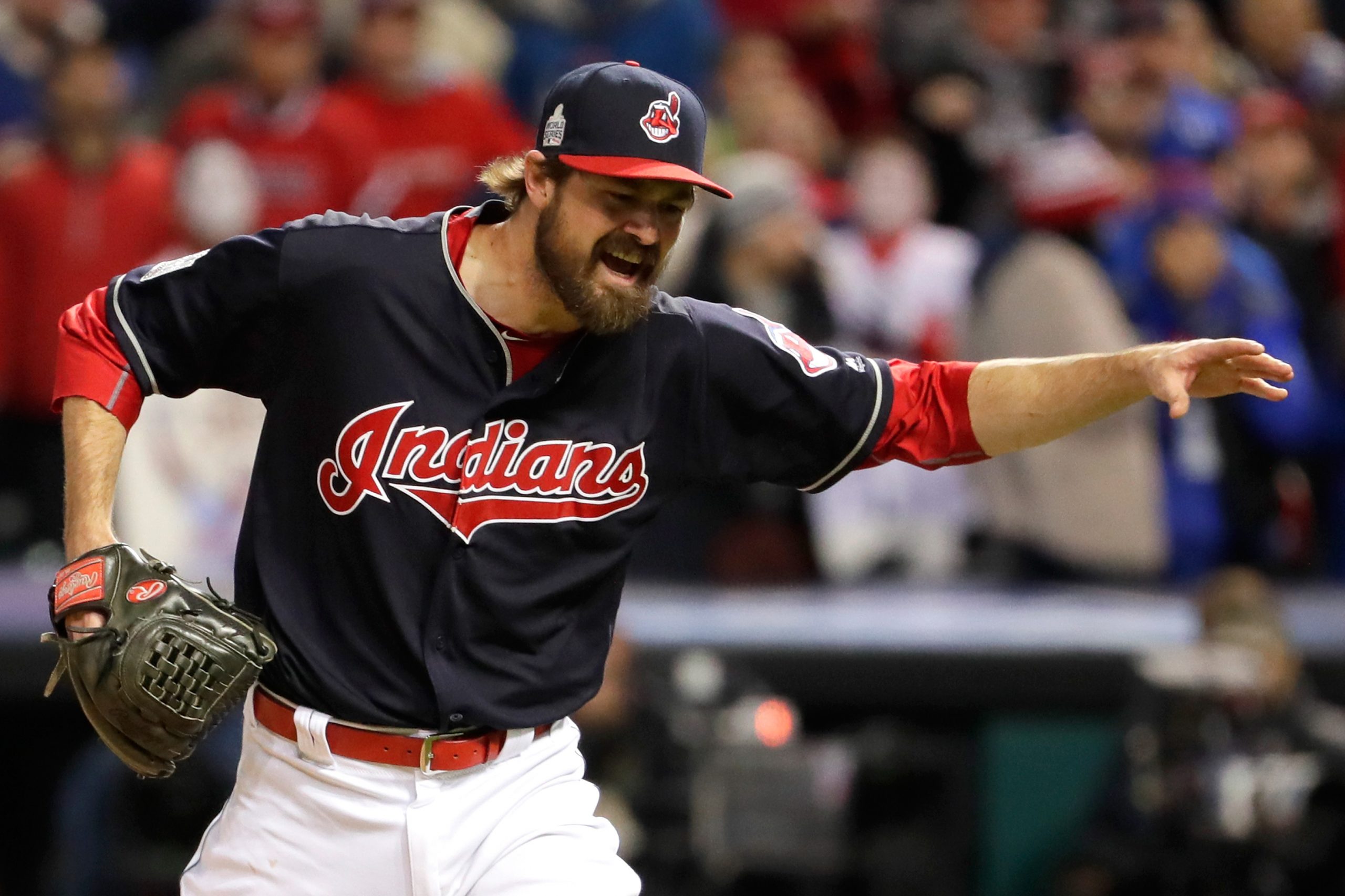Before the ALCS, Las Vegas set the odds of Andrew Miller winning the ALCS MVP at 18-1. Two games into the series, many fans may be wishing they had called their bookie.
Perhaps words do not justify how crucial Miller’s performance has been so far in the postseason. When Cleveland traded for Miller in July, they knew they were getting a top notch reliever, capable of making opposing hitters look as silly as he did on Saturday vs. Toronto:
[protected-iframe id=”8ad1eba7d7765bdfbe6f2554d8e74e84-114320562-107853376″ info=”https://vine.co/v/5HhmUlTvdtH/embed/simple” width=”480″ height=”480″ frameborder=”0″]
However, Cleveland originally envisioned Miller coming into the 8th or 9th inning, after 7 strong innings from Corey Kluber, Carlos Carrasco, or Danny Salazar. Miller’s dominance was supposed to be a sideshow, but with the Tribe’s starting pitching crippled by injury, he is now the main event, and his fastball/slider combination has not disappointed:
Pick your poison Andrew Miller edition. Fastball vs Slider pic.twitter.com/qaQ4hTpIZQ
— Ryan Parker (@RA_Parker) October 15, 2016
In two games vs. Toronto in the ALCS, Andrew Miller has faced 12 batters and struck out ten. You read that correctly: 10 of 12 hitters couldn’t even put the ball in play against Miller on Saturday. The two balls in play? One was a ground out by Ezequiel Carrera, and the other was a single against 2015 MVP Josh Donaldson. To put Miller’s incredible pitching into perspective, he became the first relief pitcher to ever record five strikeouts in consecutive playoff games on Saturday.
Now, Miller’s brilliant performance isn’t a surprise. The argument can easily be made that he was the best relief pitcher in baseball in 2016 after posting an impeccable 1.45 ERA while striking out an other-worldly 44.7% of opponents while just walking an equally impressive 3.3%. That was the reason the Indians traded four high-quality prospects in Clint Frazier, Justus Sheffield, Ben Heller and J.P. Feyereisen to acquire the Miller from the Yankee’s.
With that in mind, it can be reasoned that Miller was expected to be this good, but considering the circumstances, Miller’s performance deserves extra-recognition. Without the 6’7 lefty’s brilliance, the Indians likely would already have been sent home. Rather than risk a starting pitcher going through hitters like David Ortiz, Mookie Betts, Hanley Ramirez, Josh Donaldson, and Edwin Encarnacion for a third time, Miller has been available to come in and silence some of the best hitters in the game. This postseason, that group of elite hitters have gone a combined 2-7, with 6 K’s, and one walk against Miller. Even when facing the best hitters in baseball in crucial situations, Miller has delivered.
Along with making himself available to pitch in any inning, Miller has also been invaluable to Cleveland with his ability to execute even while taking on a bigger workload than usual this postseason: in the ALDS vs. Boston, Miller threw 40 and 35 pitches in his appearances in Games 1 and 3, while in the first two games of the ALCS vs. Toronto, he has thrown 31 and 24 pitches. During the regular season, 25 pitches would be on high-end for any appearance, but Miller has shown no signs of fatigue, averaging 95 mph on fastballs on pitches 31-45, according to Inside Edge Scouting.
Whether that kind of workload will continue to be sustainable is unknown, but so far this postseason, the Indians have needed every pitch they can get out of Miller, as they often are finding themselves clinging to 1-3 run leads. While the Indians’ offense has hardly been dominant, averaging 3.8 runs per game in the playoffs, Cleveland’s pitching – led by Miller – has erased any offensive shortcomings so far in the playoffs.
At this point, it is safe to say that no matter what Frazier, Sheffield, Heller, and Feyereisen become, Cleveland will never regret making the trade for Miller – he very well could pitch them to the World Series, and maybe even help them win it.
Add The Sports Daily to your Google News Feed!
